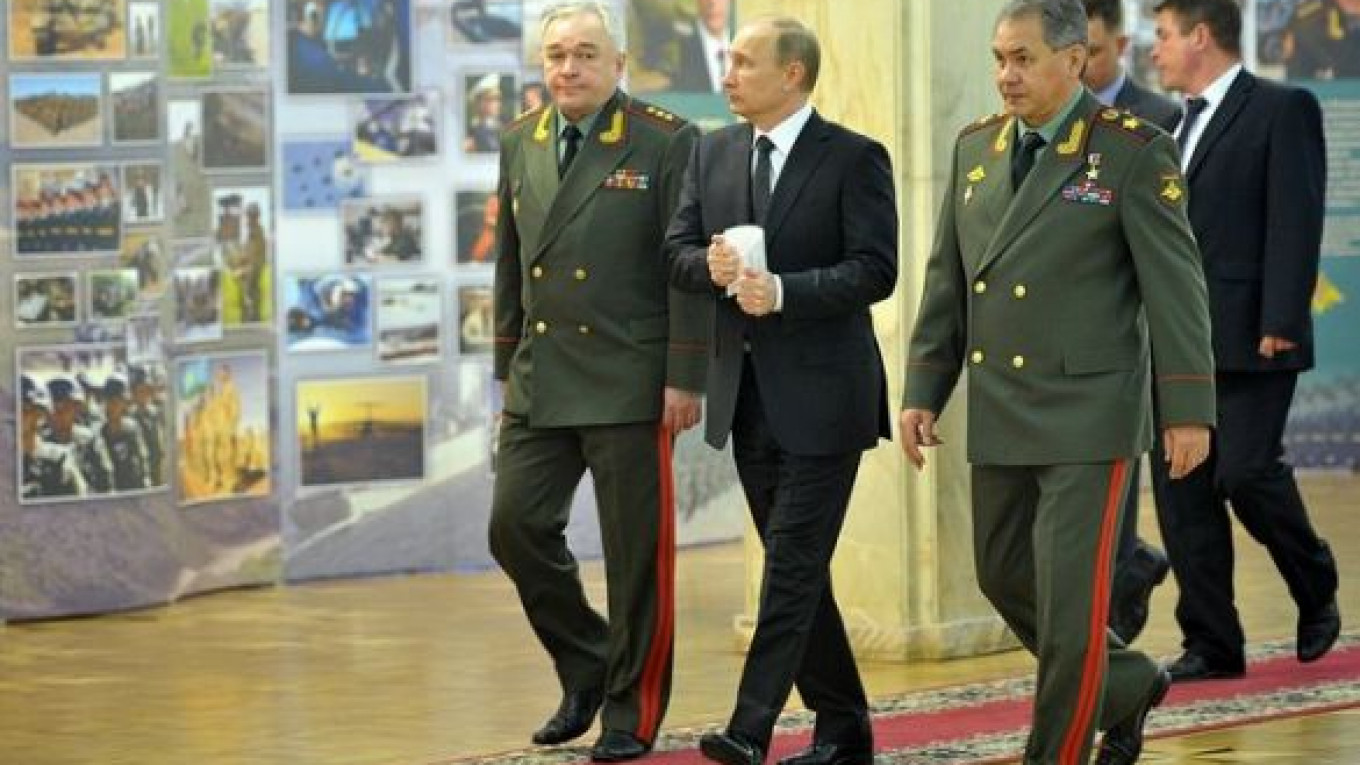President Vladimir Putin on Tuesday called on Russia’s top military leadership to deliver a “drastic upgrade” to the country’s military capabilities over the next three to five years to thwart “systematic attempts to undermine the strategic balance.”
Speaking at an expanded meeting of the Defense Ministry Board, which includes Defense Minister Sergei Shoigu, Putin said the current geopolitical conditions demanded “swift actions.” He identified potential threats, including U.S. missile defense deployment, further eastward NATO expansion and militarization of the Arctic. “All these challenges … all of this directly affects our national interests and, accordingly, defines the placement of our priorities,” Putin said.
But analysts said Russia’s military modernization effort faces major problems, including incorrect assessment of the threats to the nation.
“There is no anti-Russia conspiracy inspired by Washington, and there is no coordinated anti-Russian policy in the world,” said Konstantin Oznobishchev, director of the Institute for Strategic Assessment.
In 2007, Russia embarked on one of the most ambitious military reforms in its history, announcing plans to spend more than 23 trillion rubles ($750 billion) by 2020 to completely overhaul its military hardware.
Former Defense Minister Anatoly Serdyukov rooted out much of the cumbersome Soviet legacy from the defense sector, drawing praise from pundits for introducing a more mobile and well-knit command structure and improving cooperation between branches of the armed forces. Some of Serdyukov’s actions were seen as too aggressive, however, such as the dismissal of over 60 percent of the officer class, and he was unpopular among much of the top brass.
Following Serdyukov’s dismissal in November amid a corruption scandal at Defense Ministry agency Oboronservis, observers have been watching closely to see whether Shoigu shifts course.
Putin opened Tuesday’s meeting by praising Shoigu, a longtime ally of the president, and General Staff head Valery Gerasimov, who was also appointed to his post in November. Regarding the reforms, the president said: “Overall, it’s a complex process. Without question, you can’t follow templates, but … there must not be constant seesawing or endless revisions of prior decisions.”
So far, the new defense minister has only revised some peripheral aspects of Serdyukov’s reforms, leaving “the key structural elements” intact, Dmitry Gorenburg, a senior analyst at Harvard’s Davis Center for Russian and Eurasian Studies, said in a blog post. Shoigu has restored the Soviet-era military education scheme but kept brigades as the military’s most important units, Gorenburg noted.
Oznobischev said he doesn’t think it matters who occupies the helm of the Defense Ministry. “The main problem is that our military policy lacks strategy,” he said. “For instance, we do not know why we need to spend 23 trillion [rubles] on weapons purchases.”
The massive state armaments program has been a major point of contention in the government. In September 2011, Finance Minister Alexei Kudrin was dismissed from his post by President Dmitry Medvedev, ostensibly over Kudrin’s conviction that too much money was being budgeted for arms expenditures.
On Tuesday, Putin insisted that all provisions of the state armaments program be fulfilled.
The president also touched on various hot-button issues facing the military, giving assurances that the term of mandatory military service will not be increased beyond the current 12 months and demanding that all officers receive housing, as they had been promised.
Contact the author at i.nechepurenko@gmail.com
A Message from The Moscow Times:
Dear readers,
We are facing unprecedented challenges. Russia's Prosecutor General's Office has designated The Moscow Times as an "undesirable" organization, criminalizing our work and putting our staff at risk of prosecution. This follows our earlier unjust labeling as a "foreign agent."
These actions are direct attempts to silence independent journalism in Russia. The authorities claim our work "discredits the decisions of the Russian leadership." We see things differently: we strive to provide accurate, unbiased reporting on Russia.
We, the journalists of The Moscow Times, refuse to be silenced. But to continue our work, we need your help.
Your support, no matter how small, makes a world of difference. If you can, please support us monthly starting from just $2. It's quick to set up, and every contribution makes a significant impact.
By supporting The Moscow Times, you're defending open, independent journalism in the face of repression. Thank you for standing with us.
Remind me later.






